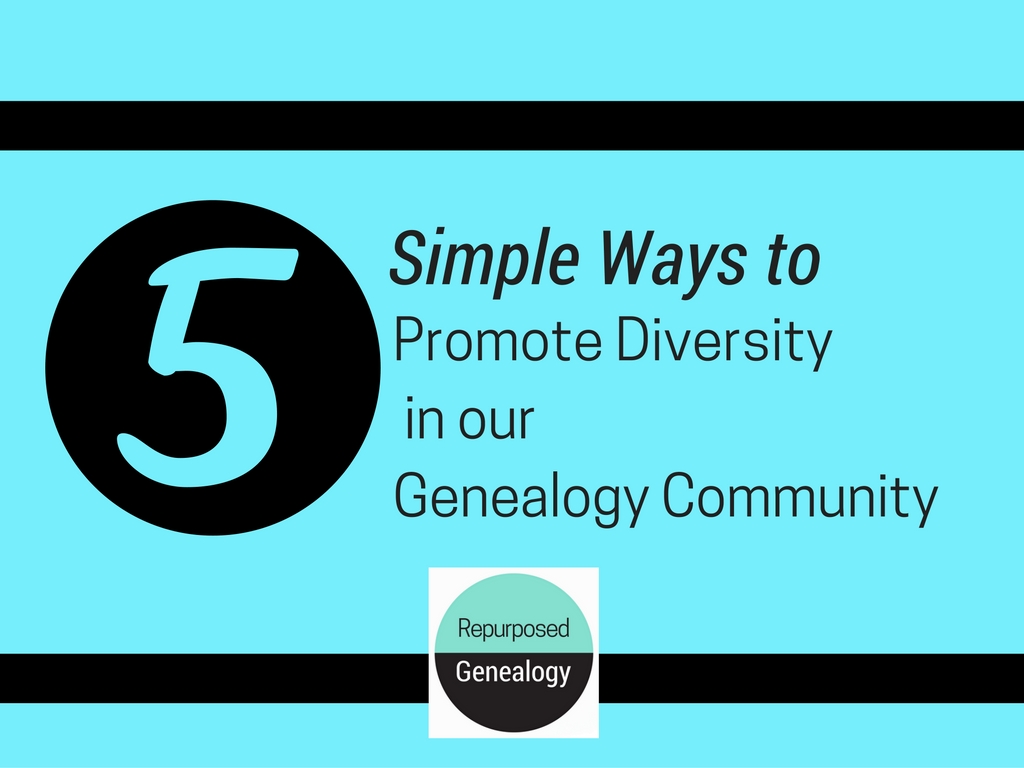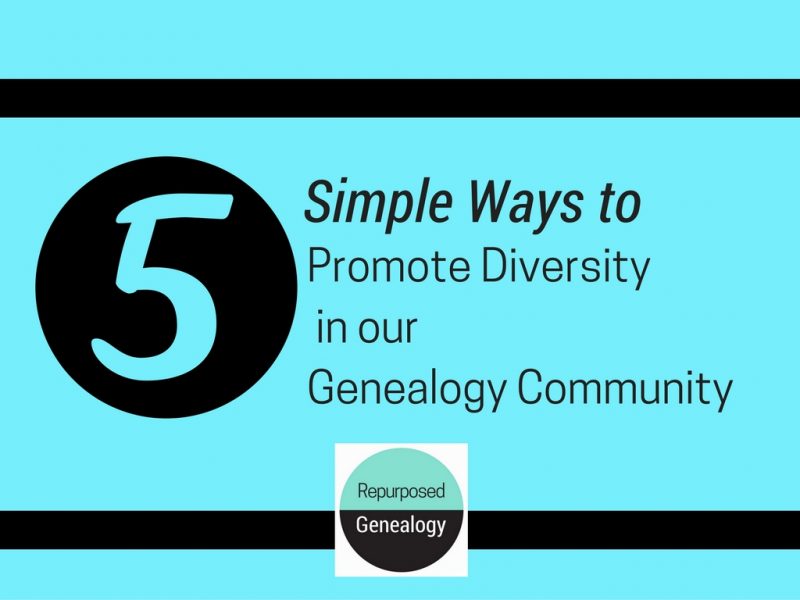I’ve been thinking about Nicka Smith’s blog post for the past two days. She called out the racial bias that exists in the genealogy community.
She called genealogy “lily white”, and I cringed.
I cringed because, I agree with her.
I’ve been thinking about what I have done, as a white woman, and will continue to do to help change the genealogical culture that exists.
White privilege what ever form it takes, disturbs me.
I hope it bothers you, too.
As a white genealogist, here are 5 simple things you can do today to foster diversity in the genealogy community.
5. Support genealogists who are people of color by reading, following and commenting on their blogs and podcasts. Attend genealogy lectures to hear people of color speak. Learn about as many cultures as possible that are different than your own. It will make you a better researcher, and in my opinion a better person as well.
4. Share content on your social media networks, blog and Facebook pages that will be useful to people of color in their genealogical research. You never know if the article you share will be the one someone needs to break down a genealogical brick wall.
3. Review your genealogy records for any information that will help people of color, and share it. Do you have copies of wills or bills of sale for ancestors who were slave holders? Release the names through the Slave Name Roll Project. Was your ancestor neighbors with a family belonging to a racial minority group? Do research for that family and the rest of the people in the neighborhood. Share what you find.
2. With DNA matches, warmly embrace people of color and adoptees. Reach out and offer to help with their genealogy research. Share your common ancestor and information and records. It will create genealogical good karma. It may be disturbing to realize that one of your ancestors was super shady and not the upstanding person you thought they were. You are not your ancestor though. Why not work to model the behavior you wish they had?
1. Make your voice heard. Let conference organizers know that you want to see more diverse speakers and topics. Tell them you want to see speakers and topics that aren’t just for 80 year old white guys. Call an organization out on it if they are falling short. Your voice, opinions, and money matter.
These are just 5 easy to implement ideas. I do not think that systemic change will occur instantly. Change will occur when we stand up and collectively acknowledge that the way things are now, needs to change.
What will you do to promote diversity in our genealogical community? Click To TweetWhat will you do to promote diversity in our genealogical community?



Excellent blog and so fitting ! Thank you
Thanks Vicky!
If this behavior spread, it would make such a difference.
I agree Kristin. I think that it can be the small things that we do that can make the biggest difference. There are big changes that need to happen, but I think this would be a good start.
Great thoughts and some helpful suggestions for some solutions!
Thanks Pat for reading and commenting. I believe that change is possible. Sometimes people just need a reminder that they can perform small acts of kindness that make big impact collectively.
Hi Jen,
Your item #3 is more important to me than anything you’ve listed!
I cannot tell you how many times I have come across old wills and other info on wbsites or message boards of white genealogists where information regarding slaves being passed down by the original slave owner to his wife or young children have been redacted. How do I know this is really happening? I know this because I luckily have acopy of the original document in my own files. But when I respectfully send a message to the person who posted this redacted document for the copy of the original they redacted info from just to see if they will be true to the research they claim they practice, I get crickets . . . no response.
As a result of this, in the past 2 years I’m really not caring whether white genealogists (professionals or hobbyists) support my research, visit my blog and leave a comnent or not. At least Jen when they don’the show up I know with certainty they are not being fake about their support of my research. In my opinion (and let me be clear these are my opinions) those who hide, alter, and change info and don’t tell the truth about their ancestors in their family trees don’t respect the field of genealogy no matter how loud they profess that they do!
I appreciate your post and even appreciate you taking on this topic before white genealogists. But what I’m not interested in anymore is the lipservice often given by white genealogists in this area when I attend workshops and conferences around my state and country. What I’m saying may sound harsh but it is what it is and what I won’t do anymore is try to gain respect among white genealogists who are not true to the field themselves.
Wow. Just wow. I am so sorry that this has happened repeatedly.
From speaking with other genealogists and researchers of color, I know that your experiences aren’t isolated. It’s not okay. I am not proud of some of the decisions of my ancestors, but I’m not going to lie about it or change documents.
I know that there are a lot of people in this world who are concerned with saving face, appearances or making a “good” impression rather than demonstrating integrity.
I’m not one of those people.
I knew when I published this post, it could potentially label me as a genealogy rebel and prevent me from fulfilling my aspirations of being a paid genealogy lecturer someday.
I knew that there would be those who would look at the graphic, and just eye roll and scroll.
I knew that there would be people who thought “heard it before and nothing’s changed”.
That’s not important to me.
“Many people, especially ignorant people want to punish you for speaking the truth, for being correct, or for being years ahead of your time. If you’re right, and you know it, speak your mind even if you are a minority of one. The truth is still the truth.” – Gandhi
I spoke the truth, and will continue to do so until I see measurable changes occur.